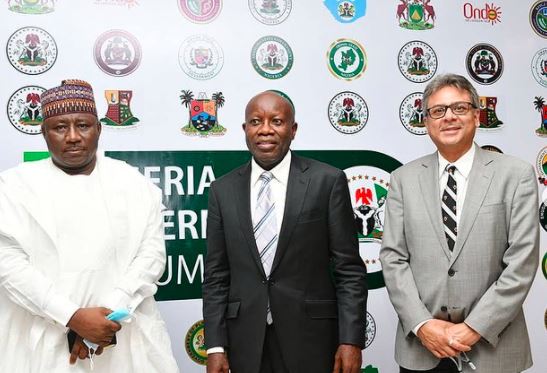The World Bank Country Director, Nigeria, Western and Central Africa Region, Shubham Chaudhuri; Deputy Director for Policy and Advocacy, Bill and Melinda Gates Foundation, Tijjani Mohammed, the Director General of the Nigeria Governors’ Forum (NGF), Asishana Okauru and Executive Chairman, Federal Inland Revenue Service (FIRS), Muhammad Nami have called for enhanced deployment of technologies to tax administration in the country to allow for effective revenue mobilisation.
Chaudhuri, Mohammed, Okauru and Nami noted that the demand for the federal and state governments to improve on their revenue to meeting the growing budgetary gap, occasioned by dwindling oil earnings and the coronavirus pandemic, makes the need to digitise the nation’s tax administration more imperative.
They spoke in Abuja on Monday at a conference on “Technology and tax” organised by the NGF, in collaboration with the World Bank and the International Centre for Tax and Development (ICTD).
Chaudhuri, who was represented by Rajul Awasthi, the Senior Public Sector Specialist, World Bank Nigeria, noted that while countries with automated tax administration were able to operate without disruptions during the COVID-19 lockdowns, nations with less digitised tax system suffered disruptions.
He added that, for a country like Nigeria, coupled with the lessons learnt under COVID-19, the road to technology adoption for tax administration is not only now critical, it is inevitable.
Mohammed noted that technology, as one of the solutions to the many problems associated with the COVID-19 pandemic, is now more central to the effective administration of tax system in view of the increasing complexities associated with modern tax administration.
He added: “While investment in technology was once seen as a luxury by administrations, evolving business practices across the globe now demand an efficient, comprehensive, accurate and interactive capability to deal with the administration of the whole revenue system within a country like ours and in a rapidly increasing number of cases across borders as well.”
Mohammed noted that with an automated system, both national and sub-national administrations would be able to deal with the increasing number of tax payers and the increasing amount of information required to manage the complexity of the interactions.
“We also need better transparency in their operations, better efficiency and greater responsiveness to the needs of both tax payers and the government to achieve better revenue mobilization and ultimately, satisfactory fiscal policy outcome for everyone.”
Okauru said the event was intended to help facilitate the scale up of modern, taxpayer-friendly, and technology-driven revenue administrations in all states of the federation to enable them to be able to provide world-class services, “characterized by efficient, paperless operations, and equipped with ICT-enabled risk-based enforcement capable of optimising their revenue mobilization strategies.”
He noted that an existing weak environment for tax policy and tax legitimacy, coupled with low technological integration in tax administration has undermined efforts to mobilise domestic revenues in the country, a development that has also undermined the capacity of tax authorities to collect taxes efficiently and the ability of taxpayers to meet their tax responsibilities conveniently.
Okauru added that a research carried out by the NGF last year showed that taxes collected across the country fell by 40 percent during the lockdown, which informed why it is now critical for all tax authorities to emphasise internet-based business support systems and payment platforms for the automation of all back-end operational processes and payments across all revenue streams.
Represented by M. L. Abubakar, Nami stressed the importance of technology application to tax administration in today’s world, noting that taxation, in most advanced jurisdictions, has gone beyond the bricks-and-mortar model but relies more on data and intelligence which are driven by technology
He added: “The adoption of technology in revenue administration processes is crucial and a major enabler for enhanced and sustainable revenue generation in a globalized and knowledge-driven world.
“Therefore, revenue authorities at all levels must adopt automated processes and embrace e-solutions both in their internal operations and in dealing with the taxpayers within their respective jurisdictions.”
By Eric Ikhilae,
The Nation



